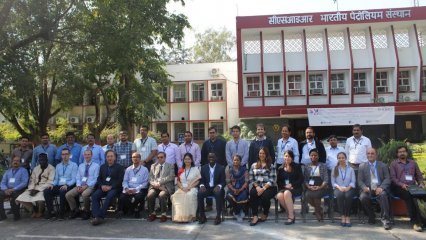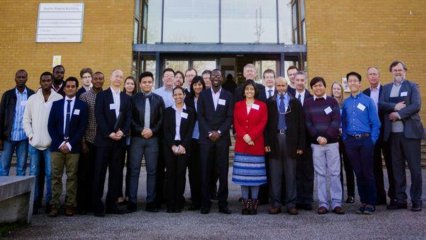

Events
We've run numerous workshops held here at the University, as well as across the world.
Upcoming events
We don’t currently have any upcoming events. Check back soon for further announcements.
Past workshops

The UK-India Newton-Bhabha Workshop ‘Energy for Economic Development and Welfare: Promoting International Collaboration, Innovation and Sustainability’ was held on 23-27 October 2017 at the Indian Institute of Petroleum in Dehradun. This event was aimed at building research capacity in integrated sustainable energy systems for poor and vulnerable populations.
Overview
India has a fast-growing economy which is amongst the lowest per capital energy consuming nations in the world. Indigenous energy production and security through integrated solutions are imperative for economic development and welfare. The organising and participating institutions involved in the workshop have shown dedication in delivering high quality research and development which progresses this highly important international agenda.
Dr Jhuma Sadhukhan said that the institutions have shown strong commitment to tackling “the challenge of socio-economic welfare by sustainable alternative energy systems development, a strongly multi-dimensional challenge in India.”
“All prioritised energy mix and technologies can be exploited, but in an integrated manner, with the support of life cycle assessment and unified policy framework involving all stakeholders,” she said. “It is the job of researchers to make sure that the research done at a laboratory has a societal and economic benefit applying whole system concept. This workshop should share visions to make a progress through the scale. The system has to be integrated, multi-process, multi-product, multi-sector and cyclical.”
Read more about discussions at the workshop.

Bio-based products, such as food and pharmaceutical ingredients; fine, specialty and platform chemicals; polymers and fibres; and fuel and energy, have seen decreasing priority of production, from high value-low volume to low value-high volume products. These products have to be produced in an integrated system, using biorefinery, to achieve the highest resource efficiency and sustainability.
Some chemicals are referred to as ‘sleeping giants’ owing to their vast potential in the emerging bioeconomy, their key positions in the production of biomass-derived intermediates, and the transition from fossil based to bio-based economy. For newer bio-based businesses, targeting such high-value niche chemicals alongside bioenergy and biofuel products is a more profitable option, compared to a stand-alone biofuel or bioenergy production facility.
In this international forum on 'biorefinery systems for social welfare and economic development', we focused on synthesis across the scales, of priority building block molecules. Examples include:
- Levulinic acid
- 5-hydroxymethylfurfural
- 2,5-furandicarboxylic acid
- Succinic acid
- Lactic acid.
Diverse applications (e.g. healthcare, personal care and home care sectors, specialty chemicals, food industry, agrochemicals, fuel, pigments and plastics) of product derivatives from these building block molecules are the rationale of selection of these molecules. Not a drop should be wasted or go to landfill, and every bit is a resource and has value for society – which is responsible in generating it in the first place. This philosophy echoes the ‘utilisation of bottom of barrel’ strategy that founded the petroleum industry.
Process development and integration into existing biofuel plants (retrofitting) is also a perspective to consider as some residual streams could be sources of high value compounds that could enhance the economic and environmental viability of biorefineries. This is also needed for enabling biomass as a basis for green chemistry and for developing a sustainable bioeconomy.
Delegates heard that in order to accelerate the shift from a fossil-based economy to a bio-based circular economy, research needs to focus on the ‘process integration’ imperative.
Files

Through this workshop we provided hands-on training in problem solving in biorefineries. The fundamental flowsheeting concepts covered originated from reaction engineering, separation system design heuristics, pinch analysis, heat integration, heat recovery network design, utility or total site system design, and combined heat and power system design.
At the outset, we clearly laid out the drivers for biorefineries, i.e. target high-value niche chemical productions. Then, step-by-step, process synthesis and design analyses were systematically applied for an overall integrated process flowsheet design. We also offered training in techno-economic analysis, life cycle assessment and life cycle sustainability assessment.
Depending on training needs, modules were run over one to four weeks. See our advanced authored textbook, Biorefineries and Chemical Processes.
Files

The ‘Bioenergy, Biorefinery and Bioeconomy: Promoting Innovation, Multidisciplinary Collaboration and Sustainability’ workshop was held 30 May to 3 June 2016 in Kuala Lumpur, Malaysia.
The workshop was offered under the Researcher Links scheme offered within the Newton Fund and coordinated by Dr Jhuma Sadhukhan (University of Surrey) and Dr Mimi Haryani Hassim (Universiti Teknologi Malaysia). Other leading researchers contributing to the workshop included Professor Richard Murphy, Dr Kok Siew Ng and Dr Elias Martinez-Hernandez (University of Surrey), Professor Denny K S Ng (University of Nottingham Malaysia) and Professor Abdul Wahab Mohammad (Universiti Kebangsaan Malaysia).
Overview
The workshop, in line with the National Biomass Strategy 2020 and 1Malaysia Biomass Alternative Strategy (1MBAS) Initiatives, was aimed at bringing together early career researchers, stakeholders and experts in bioenergy and biorefinery for knowledge transfer and systematic innovative solution between UK-Malaysia, with a vision of replacing fossil fuels and creating a sustainable and circular bioeconomy.
Biorefinery is an integrated facility that converts organic materials, e.g. food wastes, forestry and agricultural residues and municipal solid wastes into useful products, transportation fuels, chemicals, heat and power, analogous to petroleum refinery. Biorefinery has the potential to meet the growing demands for energy and products, close the loop of resources, and mitigate the impact of climate change. However, it needs to be advanced in terms of technology innovation and sustainability, and should be built upon local supply-demand chain, socio-economic conditions and environmental policies.
Publications
Sadhukhan J et al. 2018. Role of bioenergy, biorefinery and bioeconomy in sustainable development: Strategic pathways for Malaysia. Renewable & Sustainable Energy Reviews, 81(2), 1966-1987. https://doi.org/10.1016/j.rser.2017.06.007.
Wan, Y.K., Sadhukhan, J., Ng, K.S. and Ng, D.K., 2016. Techno-economic evaluations for feasibility of sago-based biorefinery, Part 1: Alternative energy systems. Chemical Engineering Research and Design, 107, pp.263-279. https://doi.org/10.1016/j.cherd.2015.11.001.
Wan, Y.K., Sadhukhan, J. and Ng, D.K., 2016. Techno-economic evaluations for feasibility of sago-based biorefinery, Part 2: Integrated bioethanol production and energy systems. Chemical Engineering Research and Design, 107, pp.102-116. https://doi.org/10.1016/j.cherd.2015.09.017.
Sadhukhan, J., Ng, K.S. and Martinez-Hernandez, E., 2015. Process systems engineering tools for biomass polygeneration systems with carbon capture and reuse. Process Design Strategies for Biomass Conversion Systems, pp.215-245.
Wan, Y.K., Sadhukhan, J., Ng, K.S. and Ng, D.K., 2015. Techno-economic evaluation of sago biomass-based combined heat and power (CHP) system. In Asia Pacific Confederation of Chemical Engineering Congress 2015: APCChE 2015, incorporating CHEMECA 2015 (p. 2532). Engineers Australia.
Files

The use of biomass to replace or substitute existing products makes biorefineries an attractive alternative to tackle current global problems derived from the extensive use of fossil resources (crude oil, natural gas and coal) as raw materials. Biorefineries are a means to process locally available raw materials (residues and wastes generated from cities or agriculture) into products, carbon content from which is continuously captured from the environment thus reducing the net GHG emissions, and contributing to climate change mitigation.
This can only be realised in a sustainable manner if the establishment of biorefineries is a result of extensive collaborative research and development with a focus on the search for optimal combinations of feedstock-process technologies-products across the value chain that provide the best trade-off between economics, environmental impact and social development.
This workshop provided a platform for early stage researchers from the UK and Mexico to discuss the concepts and strategies for the development of sustainable biorefineries. It was designed as a forum for a technical review and evaluation of existing research on biorefinery technologies, as well as to foster partnerships and spread information about activities in the area. This allowed the workshop to gather valuable inputs from existing initiatives and to establish consensus about research priorities and the path forward in the field.
The workshop promoted the creation of research consortia between researchers from both countries for future project developments, with an integral vision throughout for sustainable value chain creation. It sought to bring together specialists in valorisation of organic wastes, lignocellulosic residues and non-food crops for the production of biofuels, bioenergy and high value products by means of highly integrated biorefinery process schemes.